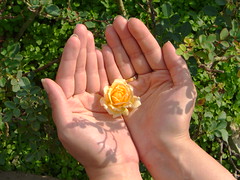We hear a lot about creating a "knowledge sharing culture" or a "learning culture", so I thought I would share with you what I believe is the big culture shift that KM both requires and facilitates.
But first let me tell you a story. When I joined BP in the late 80s (being at the time a geologist in Britoil, which BP took over), I went to an internal Geology conference in Houston Texas. It was rater a scary affair. At the time, the internal culture in BP was very much one of internal intellectual competition. Knowledge was treated as personal competitive advantage – your own should be defended and promoted, that of others should be shot down. So throughout the conference, people stood up and presented their papers, then tried to defend them from blistering attacks from the audience (I may be exaggerating a little, but that’s how it struck me at the time).
A decade later I was on the organizing board of a similar BP internal Geology conference, in San Diego, and I remember vividly a pair of presenters starting their presentation with the words “We are stuck. We have a problem we don’t know how to solve. We would like to explain it to you, and to see if you, the audience, can help”. What a change in culture! What a difference! No more “defend and attack”, but instead an openness to listen and learn.
In those intervening 10 years, BP had been through a deliberate process of culture change, bringing in a culture of Openness, Performance-focus, Networking and Empowerment. This was the culture change that made KM implementation so much easier in BP. So how do we characterize this change in culture as it relates to knowledge? For me it is a profound shift from the individual to the collective
- From “I know” to “We know”
- From “Knowledge is mine” to “Knowledge is ours”
- From “Knowledge is owned” to “Knowledge is shared”
- From “Knowledge is personal property” to “Knowledge is collective/community property”
- From “Knowledge is personal advantage” to “Knowledge is company advantage”
- From “Knowledge is personal” to “Knowledge is inter-personal”
- From “I defend what I know” to “I am open to better knowledge”
- From “not invented here (i.e. by me)” to “invented in my community”
- From “New knowledge competes with my personal knowledge” to “new knowledge improves my personal knowledge”
- From "other people's knowledge is a threat to me" to "our shared knowledge helps me"
- From “Admitting I don’t know is weakness” to “Admitting I don’t know is the first step to learning”
That shift from “I know” to “we know” – from “Knowledge is mine” to “Knowledge is ours” is a huge one, and counter-cultural to many of us. People can find it scary, but once it has been achieved, it is like living in a different, and far better, world.





2 comments:
Nick
I was putting together a blog post on knowledge sharing in maintenance environment in the steel industry in context of the GFC. I have quoted and given attribution to this post in my own
kind regards
KerrieAnne
Nick, Thanks for sharing your insights.
Post a Comment